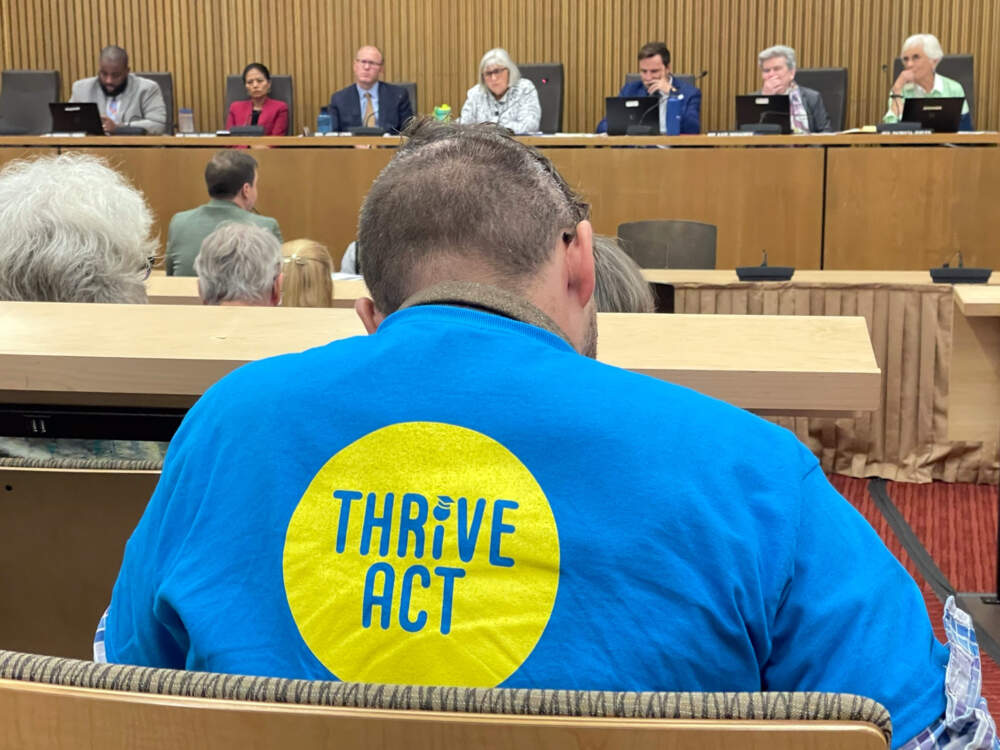Advertisement
A bill that would lower the stakes of the MCAS has its hearing on Beacon Hill

Twenty-five years after it was first administered, the high-stakes standardized test used in Massachusetts schools is facing unprecedented pushback.
Speaking during a hearing on Beacon Hill Wednesday, teachers, advocates and elected officials pushed for a bill that would roll back the MCAS test’s decisive role in public education for the first time since 1998.
The bill — known as the Thrive Act — would not eliminate the MCAS, but would suspend its use as a high school graduation requirement. It would also end the state takeover of chronically low-scoring schools and districts.
Supporters of the Thrive Act said the MCAS doesn't reflect students’ full capacity and fails to close real achievement gaps between groups of students. Meanwhile, the bill’s opponents said the test provides a meaningful, high standard across a diverse state.
The Thrive Act has the backing of teachers’ unions, educators and parents. They argue that students’ MCAS scores are shaped to a large extent by their life experiences, especially immigration, disability, and economic opportunity — and that as such, penalties based on those scores are fundamentally unfair.
Throughout hours of testimony Wednesday, the overwhelming majority of speakers sought to change that, with many singling out state receivership — the takeover of an underperforming school or district — for particular criticism.
“The state-takeover law has failed to improve student outcomes everywhere it's been tried,” said Sen. Adam Gomez of Springfield. “Instead, it's created destructive learning environments... and kept local students, parents, educators and community members from having a voice in how our schools are run.”
The practice of receivership began with a law enacted in 2010. Since then, three districts — Lawrence, Holyoke and Southbridge — have passed under state control, while none have seen it relinquished. All three, Thrive Act supporters noted, are majority Latino and low-income.
And all three remain among the state’s lowest performers on MCAS after up to a dozen years in receivership.
Alongside the Thrive Act, teachers’ unions and public-education advocates are also supporting a narrower proposed ballot measure for 2024, which would only end the MCAS graduation requirement.
Advertisement
Neither proposed measure would eliminate the use of the MCAS as an annual diagnostic tool in grades 3 through 8 and in grade 10 — a schedule still determined in part by state and federal law.
But Ed Lambert, a former lawmaker and head of the Mass. Business Alliance for Education, said both measures start the state down “a path of moving away from MCAS” altogether.
Lambert warned Wednesday that the Thrive Act’s passage could “return us to a period of savage inequality.” After his testimony, Lambert traded comments with Sen. Pat Jehlen of Cambridge, who disputed the idea that Massachusetts schools were struggling before the 1993 reform that introduced the MCAS.
Like Lambert, Mary Tamer, head of Democrats for Education Reform, said that the test, with its current stakes, gives meaning to high school diplomas, and that eliminating those stakes “would leave us without a common, objective measure of achievement that all students, across all communities, are expected to meet.”
The joint committee on education began its hearing later than usual —at 2 p.m. — to better accommodate working educators and students. It attracted a crowd of dozens to the State House’s Gardner Auditorium, most wearing blue T-shirts in support of the Thrive Act.
They were set to hear from 120 speakers from across the state over several hours, with each one limited to two minutes of comments.
